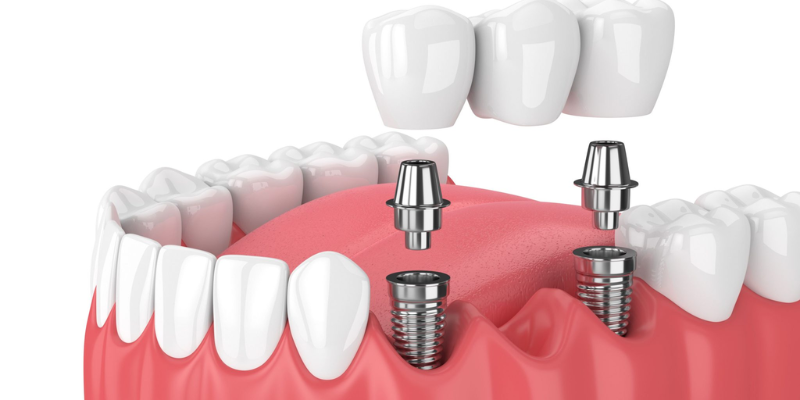Dental Implant Centers
Client’s want to know ” clear choice dental implant centers “. Dental Implant treatment application is an application to reshape damaged or missing teeth using metal implant treatment screws of artificial teeth that are very similar and function similarly to real teeth. Dental implant treatment can replace ill-fitting dentures or bridges. When the natural root is missing, it can be considered as an alternative, as dentures cannot be replaced. How dental implant treatment is performed depends on the type of implant treatment and the composition of the jawbone. The biggest benefit of implants treatment is that they provide good support for your new teeth. However, since bones take a long time to heal, this process can take several months.
The tooth implants are surgically placed on the roots of missing teeth on the jawbone. As the titanium in implants merges with the jawbone, it does not slide, cause problems, or cause bone damage, like permanent bridges or prostheses. Such implants do not rot. Like any surgery, those with dental implants may have some side effects. However, side effects are insignificant and treatable. Infection at the implant site. Trauma or damage to other teeth or blood vessels. Nervous damage can cause pain, numbness, or tingling in your own teeth, gums, lips, or jaws. The sinuses problems, when the tooth implants installed on your chin fall into one of your bosoms.
What Is Done In the Clear Choice Dental Implant Centers?
The treatment process for dental implants consists of a variety of specialists, who specialize in the treatment of structures that support the teeth. You may need a periodontist and sometimes an otolaryngologist. Since dental implants require more surgeries, a thorough evaluation is required to prepare for the following procedures. Comprehensive dental examination: Take dental x-rays and 3D images to design a model made of teeth and jaws. Check your medical history: Tell your doctor if you have taken prescriptions or supplements. If you have chronic heart disease or orthopedic implants treatment, your doctor may recommend antibiotics before surgery to prevent infection. Treatment Plan: This plan is tailored to your specific situation and considers factors such as the number of teeth needed, the condition of the jawbone.
To provide pain management, surgery anesthesia options include local anesthesia, general anesthesia. The option that suits you best will be evaluated by your doctor. The dental treatment team will provide a list of what to eat and drink before surgery, depending on the type of anesthesia given. If you have been sedate or under general anesthesia, it is advisable to rest at home as someone will need to take you home after surgery. Surgical implantation treatment is an outpatient operation that is usually perform in stages. The process of installing a dental implant treatment includes several steps, including the removal of a damaged tooth. Jaw preparation as needed. Installation of a dental implant treatment.
Is a Dental Implant Treatment Suitable for Everyone?
In the treatment of gum recession, various filling techniques are use. The tooth may be completely cover. In advanced cases, a surgical method is use. In the surgical method, healthy tissues in the surrounding area are displace to the damage area and cover the retract area, or a graft is take from the palate is surgically add to the retraction area. Anyone who is healthy enough to have routine tooth extractions or oral surgery can generally be consider suitable for dental implants treatment. Adequate bones and healthy gums are a must. Patients should pay attention to post-implant oral hygiene and visit their dentist regularly. Heavy smoking, diabetes or heart disease, radiation therapy to the head/neck region should assess implant treatment placement on an individual basis. You should speak with your dentist to find out if an implant treatment application is right for you.
Dental implants treatment is not currently cover by dental insurance. Special coverage may also be available depending on your insurance plan and/or the cause of the tooth loss. You can direct detailed questions about this topic to your dentist and insurance provider. Sometimes this process can take months. Most of the time will be spend waiting for the new bone that has form in the jaw to grow and heal. Depending on your situation, the special procedures performed. Some steps can sometimes be combine. Dental implants treatment may generally be suitable for you if: You have at least one or more teeth. If you have a fully developed jawbone. If you have enough bone to repair the implants treatment. Or if you can do a bone graft. If you have healthy oral tissues.
What Are the Types of Clear Choice Dental Implant Centers?
If your jawbone isn’t fat enough or too soft, you might need a bone transplant before dental implantation treatment. In these cases, your bone is under severe pressure with a strong chewing effect on your jaw. So, if the implant treatment can’t be sustaine, the operation is likely to fail. There are several materials for bone transplants that can be use to restore jawbone. Options may include a natural bone transplant, or a synthetic bone transplant. Such as bone replacement material, that can provide support structures for the growth of a new bone. Your doctor will inform you of the most appropriate options for you. It may take months before the transplanted bone grows enough to support the dental implant treatment.
In some cases, only a small bone transplant may be require, which can be perform at the same time as an implantation treatment operation. Your jaw condition will determine further action. During surgery, while the dental implant is in place, the oral surgeon makes an incision to open the gums and expose the bone. A hole is make in the bone where the metal post of the dental implant is place. In this case, the tooth will come off. In other words, there is a gap in the mouth. If desire, artificial temporary implant prosthesis can be place to destroy the unaesthetic appearance. The insert denture can be remove during care or sleep.
Main Reasons to Be Denied Weight Loss Surgery
If you are considering weight loss procedures and are concerned about reasons to be denied weight loss surgery, there are ways to increase your chances of success. Start by eating healthier foods, exercising regularly, and visiting your doctor for a checkup. Additionally, if you have a medical condition that can be managed with medication or lifestyle changes, taking those necessary steps to improve your health will help you qualify for weight loss surgery. By making these proactive steps, you can look forward to the benefits of successful weight loss surgery with improved health outcomes in the future.

It is important to remember that many insurance plans will cover some of the costs associated with stomach surgery for weight loss and that there may also be additional financial assistance available through charitable organizations or state-funded programs. If the reasons for the initial denial are addressed and resolved, it may become possible for you to have the surgery after all. Ultimately, it is important to discuss different options available with your healthcare provider before making a decision about healthcare treatments like weight loss surgery. Working with professionals can help you stay motivated and focused on your end goal so you can see real progress over time.



